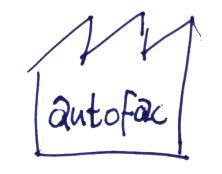Autofac 2 Status Update

Revision: 398
Author: nicholas.blumhardt
Date: 8:06:55 AM, Monday, 21 July 2008
Message:
Added 2.0-experimental branch for exploration of internal refactorings.
Yes, work on Autofac 2 began a year and a half ago! While work all but stopped while I did other things in Redmond, I’m pleased to say that a beta is finally in sight.
You might be curious just how close is ‘close’: there are six items in the issue tracker that I think need to be addressed:
-
98 Support named registrations for open generics
-
140 Cache constructor bindings in ReflectionActivator
-
150 Human-readable display strings and [DebuggerDisplay]
-
154 Update ConfigurationSettingsReader (XML Config Support)
-
155 Update contrib and examples to 2.1
-
160 Scan assemblies for modules
Most of these are pretty unexciting - minor features, niceties and dependent project updates.
Issue 98, however, has been in the system a while. One of the core improvements in Autofac 2 makes it easier and much more efficient to add support for dynamically-generated component registrations.
As an example, if IFoo is registered, Autofac provides or can be extended to provide:
-
Owned
for explicit ownership/Iifetime control -
Func
for dynamically creating IFoo components -
Lazy
and Lazy<IFoo, IFooMetadata> for lazy instantiation
These can even be composed automatically to give Func<Owned
Under the hood, each extension is a handler that can look at a requested Service, query other available services, and generate a component on-the-fly that is able to fulfill the request.
The same underlying mechanism supports open generic types.
builder.RegisterGeneric(typeof(Bar<>)).As(typeof(IBar<>));
var container = builder.Build();
container.Resolve<IBar<int>>();
The handler checks to see if the requested Service is a closed instance of the open generic service type it is watching for (IBar<>). If it is, the handler creates a regular component by closing the generic component type (Bar<> becomes Bar
Now, all is well-and-good if the service is requested by type, as in Resolve
Autofac uses NamedService and TypedService to represent services requested by name and by type respectively. When a component is resolved by name, as in Resolve
NamedService, in Autofac 1.x and Autofac 2 today, doesn’t carry type information, just a string, so while Resolve
And that is at the crux of issue 98. Adding type information to NamedService doesn’t seem like a big deal, but it does touch a lot of APIs and will break some existing apps in potentially confusing ways. It may be that issue 98 is put to the side this time around. Either way a decision has to be reached before Autofac 2 can be released as a beta.
Stay tuned, and have a safe holiday if you’re lucky enough to be taking one!
